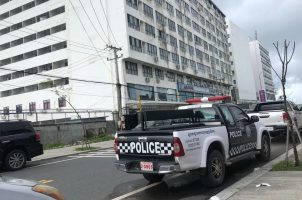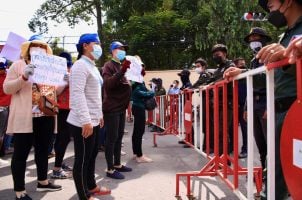PokerStars Takes the Asia Pacific Poker Tour to Cambodia for the First Time
Posted on: October 13, 2022, 12:32h.
Last updated on: October 13, 2022, 01:44h.
The Asia Pacific Poker Tour (APPT) is in full swing after missing a year, and the PokerStars-led series is adding a new stop. For the first time, it’s on its way to Cambodia, where NagaWorld will host a few tournaments next month.

PokerStars and the APPT invaded the Philippines this year, running a series of tournaments at Okada Manila. After a successful run around the APAC region, PokerStars now wants to try its hand in Cambodia.
The timing may seem a little odd to some people. NagaWorld will host the events, despite still dealing with a strike of some of its employees. At the same time, Cambodia is facing scrutiny on the international stage for its inability to control illegal casinos and human trafficking.
Testing the Cambodian Waters
There’s not much precedent for poker tournaments in Cambodia, which is a way of saying there’s no easy way to gauge the success of the upcoming series. The World Poker Tour has been there a few times and has seen a decent response, but nothing extraordinary.
PokerStars will give it a try, adding five events to the APPT. The series will begin on November 3 and wrap up on November 13. To close everything out, the Flutter-owned company will hold a Cambodia Players Party on November 12 at NagaWorld’s Arena Sports Bar.
The lead-off event is a $300 tournament with a $50K guarantee. There will also be a Super High Roller event with a $10K buy-in. But PokerStars doesn’t list a guarantee.
The main event, which will run from November 10-13, has a $1,500 buy-in and a $400K guarantee. The last event on the calendar is the High Roller, which has a $5,000 buy-in and no guarantee.
There will be a total of 39 events across the series, providing plenty of options for poker players of virtually any level. By the time the Cambodia stop is done, PokerStars will have awarded at least $550K in cash.
PokerStars is giving players a chance to earn a seat at the main event. Playing on the operator’s poker platform could lead to entry into the tournament, along with accommodations and money for expenses. The total package is worth $2,160.
NagaWorld and Cambodia Continue Struggles
The tournament comes as employees at NagaWorld continue to strike almost a year after they began. Following COVID-19, the casino made a number of changes, including several firings, which have left some employees fighting the NagaCorp-owned casino.
The strike has led to accusations that the Cambodian government is siding with the casino in an effort to scare the employees into returning to work. There have been a number of arrests and allegations of abuse at the hands of the police since the protests began. At one point, the situation was so out of control that the United Nations had to get involved.
In addition to the trouble outside the doors to NagaWorld, Cambodia is also dealing with a larger, more serious problem. Illegal casinos and fraudulent call centers have taken over certain parts of the country, relying on slave labor and human trafficking to stay in business.
There may be tens of thousands of workers, according to human rights groups, who are still in virtual prison-like conditions. Over the past few months, hundreds have been able to escape, but there are still others who are trapped.
The groups quickly relocate to other areas, according to Nikkei Asia. They learn how to adjust to once again avoid detection and pick up where they left off. One insider, who worked at one of the compounds, said that the criminals “have slipped out of the park” and are “playing a game of cat and mouse.”
Cambodia has reportedly begun efforts to crack down on illegal activity and has raided a number of compounds over the past few weeks. According to some human rights groups, the attempts don’t go far enough, and enforcement never extends to the border regions, which is where most of the problems occur.
Related News Articles
Cambodia Casino Fire: More Details Revealed, Including Owner’s Shady Past
Cambodia’s Efforts to Rid Country of Illegal Casinos are Paying Off
Cambodia’s NagaWorld Casino Strike Continues, New Talks Coming
Former Macau Junket Investor Eyes Cambodia’s Casino Market
Most Popular
Las Vegas Overstated F1 Race’s Vegas Impact — Report
Vegas Strip Clubs Wrestle in Court Over Animal Names
Las Vegas Strip Stabbing Near The Strat Leaves One Man Dead
Most Commented
-
End of the Line for Las Vegas Monorail
— April 5, 2024 — 90 Comments -
Mega Millions Reportedly Mulling Substantial Ticket Price Increase
— April 16, 2024 — 6 Comments -
Long Island Casino Opponents Love New York Licensing Delays
— March 27, 2024 — 5 Comments -
Nearly Abandoned Mall Outside Vegas Soon to Have Only One Tenant
— March 12, 2024 — 5 Comments















